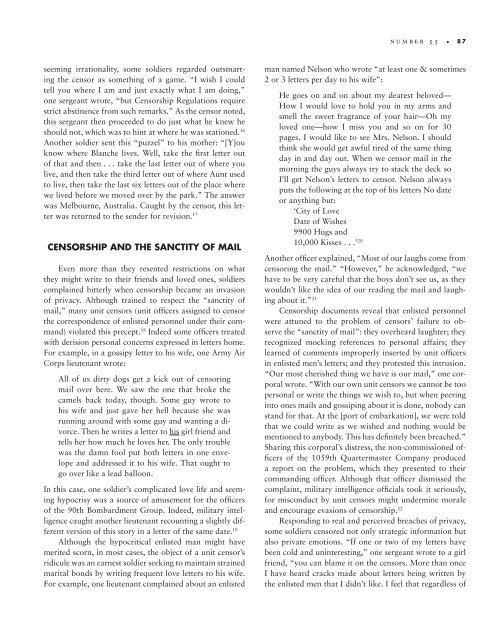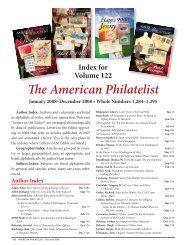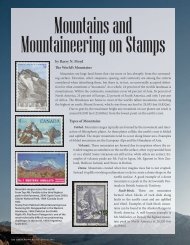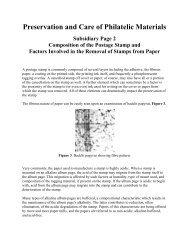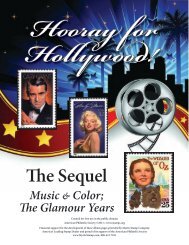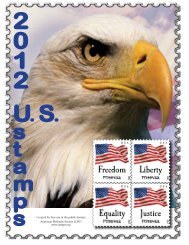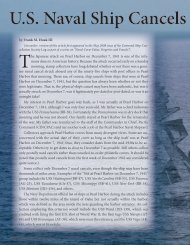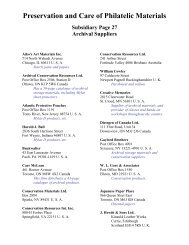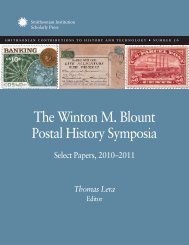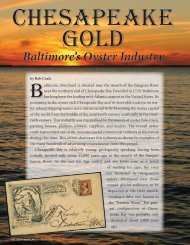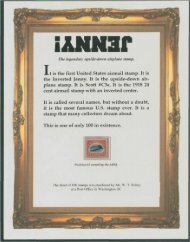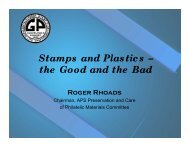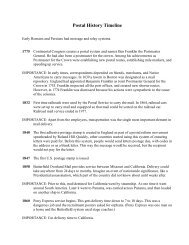The Winton M. Blount Postal History Symposia - Smithsonian ...
The Winton M. Blount Postal History Symposia - Smithsonian ...
The Winton M. Blount Postal History Symposia - Smithsonian ...
- No tags were found...
Create successful ePaper yourself
Turn your PDF publications into a flip-book with our unique Google optimized e-Paper software.
n u m b e r 5 5 • 8 7seeming irrationality, some soldiers regarded outsmartingthe censor as something of a game. “I wish I couldtell you where I am and just exactly what I am doing,”one sergeant wrote, “but Censorship Regulations requirestrict abstinence from such remarks.” As the censor noted,this sergeant then proceeded to do just what he knew heshould not, which was to hint at where he was stationed. 16Another soldier sent this “puzzel” to his mother: “[Y]ouknow where Blanche lives. Well, take the first letter outof that and then . . . take the last letter out of where youlive, and then take the third letter out of where Aunt usedto live, then take the last six letters out of the place wherewe lived before we moved over by the park.” <strong>The</strong> answerwas Melbourne, Australia. Caught by the censor, this letterwas returned to the sender for revision. 17Censorship and the Sanctity of MailEven more than they resented restrictions on whatthey might write to their friends and loved ones, soldierscomplained bitterly when censorship became an invasionof privacy. Although trained to respect the “sanctity ofmail,” many unit censors (unit officers assigned to censorthe correspondence of enlisted personnel under their command)violated this precept. 18 Indeed some officers treatedwith derision personal concerns expressed in letters home.For example, in a gossipy letter to his wife, one Army AirCorps lieutenant wrote:All of us dirty dogs get a kick out of censoringmail over here. We saw the one that broke thecamels back today, though. Some guy wrote tohis wife and just gave her hell because she wasrunning around with some guy and wanting a divorce.<strong>The</strong>n he writes a letter to his girl friend andtells her how much he loves her. <strong>The</strong> only troublewas the damn fool put both letters in one envelopeand addressed it to his wife. That ought togo over like a lead balloon.In this case, one soldier’s complicated love life and seeminghypocrisy was a source of amusement for the officersof the 90th Bombardment Group. Indeed, military intelligencecaught another lieutenant recounting a slightly differentversion of this story in a letter of the same date. 19Although the hypocritical enlisted man might havemerited scorn, in most cases, the object of a unit censor’sridicule was an earnest soldier seeking to maintain strainedmarital bonds by writing frequent love letters to his wife.For example, one lieutenant complained about an enlistedman named Nelson who wrote “at least one & sometimes2 or 3 letters per day to his wife”:He goes on and on about my dearest beloved—How I would love to hold you in my arms andsmell the sweet fragrance of your hair—Oh myloved one—how I miss you and so on for 30pages. I would like to see Mrs. Nelson. I shouldthink she would get awful tired of the same thingday in and day out. When we censor mail in themorning the guys always try to stack the deck soI’ll get Nelson’s letters to censor. Nelson alwaysputs the following at the top of his letters No dateor anything but:‘City of LoveDate of Wishes9900 Hugs and10,000 Kisses . . .’ 20Another officer explained, “Most of our laughs come fromcensoring the mail.” “However,” he acknowledged, “wehave to be very careful that the boys don’t see us, as theywouldn’t like the idea of our reading the mail and laughingabout it.” 21Censorship documents reveal that enlisted personnelwere attuned to the problem of censors’ failure to observethe “sanctity of mail”: they overheard laughter; theyrecognized mocking references to personal affairs; theylearned of comments improperly inserted by unit officersin enlisted men’s letters; and they protested this intrusion.“Our most cherished thing we have is our mail,” one corporalwrote. “With our own unit censors we cannot be toopersonal or write the things we wish to, but when peeringinto ones mails and gossiping about it is done, nobody canstand for that. At the [port of embarkation], we were toldthat we could write as we wished and nothing would bementioned to anybody. This has definitely been breached.”Sharing this corporal’s distress, the non- commissioned officersof the 1059th Quartermaster Company produceda report on the problem, which they presented to theircommanding officer. Although that officer dismissed thecomplaint, military intelligence officials took it seriously,for misconduct by unit censors might undermine moraleand encourage evasions of censorship. 22Responding to real and perceived breaches of privacy,some soldiers censored not only strategic information butalso private emotions. “If one or two of my letters havebeen cold and uninteresting,” one sergeant wrote to a girlfriend, “you can blame it on the censors. More than onceI have heard cracks made about letters being written bythe enlisted men that I didn’t like. I feel that regardless of


